 Unless we love, we don’t know who we are.
Unless we love, we don’t know who we are.
In fact, unless we love, we don’t get to become who we are.
Fortunately, Tabby’s Place gives us the most becoming opportunities. Hourly.
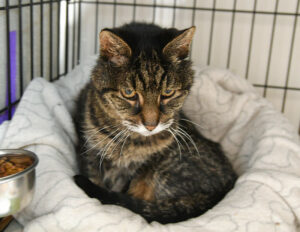 You don’t usually feel your life changing in real-time, any more than you feel the earth turning around while you sleep. This is probably a good thing, as it would be a bit disorienting to experience all of this “live.”
You don’t usually feel your life changing in real-time, any more than you feel the earth turning around while you sleep. This is probably a good thing, as it would be a bit disorienting to experience all of this “live.”
But, as sure as the globe slowly spins in front of the moon’s mirror, ready to shout “voila!” to the dawn, you are being transformed.
It was a lowercase-d day when Mortimer came calling. Coffee had been spectacular and gone stale, as usual; granola bars had been gobbled; crates and slates had been cleaned, in preparation for becoming filthy-busy again. Psych-up-for-the-day playlists had been blasted. The first four rounds of treats had been distributed. (Four down, four hundred thousand to go.)
Just the doings of a dutiful, dusty day.
But things were about to be done to our hearts that could not be undone.
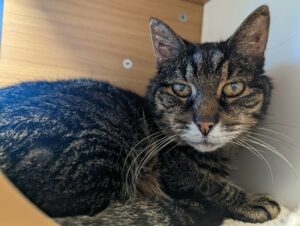 Mortimer came along in the usual way, punching his “hopeless situation” ticket on the train to Tabby’s Place. He’d been found by Animal Control, lethargic and half-frozen, ancient bones shivering like stalagmites in the creaky cave of his body.
Mortimer came along in the usual way, punching his “hopeless situation” ticket on the train to Tabby’s Place. He’d been found by Animal Control, lethargic and half-frozen, ancient bones shivering like stalagmites in the creaky cave of his body.
Mortimer spun through the usual turnstiles, getting swept over with a tiny toothbrush (the better to find ringworm) and wave upon wave of kisses (the better to begin the business of being outrageously loved).
Mortimer joined the usual parade, taking his place in Intake and the Cats In Residence spreadsheet.
Just another cat; just another name; just another number.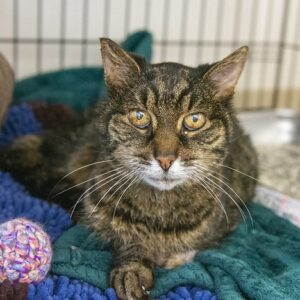
But there is no “just” in the joy that jumps the turnstiles of a lowercase-d day.
There is no “merely” in the mercy that makes us who we are.
And sure enough, we were being made new, without being made aware of it.
Mortimer was changing everything. And we had no idea it was happening.
Mortimer is, of course, the 3,834th cat at Tabby’s Place to command our love easily and instantly. Never has there ever been a cat we didn’t cherish; never shall there ever be a resident who doesn’t ravish our soft, stretchy hearts.
But never will we meet a cat who is a boilerplate cat, a placeholder cat, a cardboard-cutout, straight-from-central-casting cat. Mortimer is not “Cat;” Mortimer is Mortimer.
And only Mortimer could do what Mortimer did.
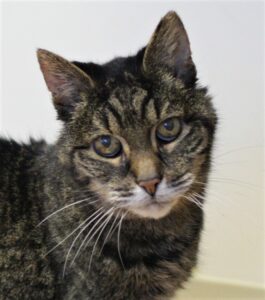 Age had turned Mort’s kidneys to Pompeii, with renal values too high for even our sensitive machines to read. But in his severely weakened state, Mortimer commanded our hearts, furrowing paths where there was once only smooth snow. Mortimer needed us, but not in the way Beckett or Eartha or any other cat had ever needed us before. Mortimer needed us in his way.
Age had turned Mort’s kidneys to Pompeii, with renal values too high for even our sensitive machines to read. But in his severely weakened state, Mortimer commanded our hearts, furrowing paths where there was once only smooth snow. Mortimer needed us, but not in the way Beckett or Eartha or any other cat had ever needed us before. Mortimer needed us in his way.
Mortimer needed us to gently stroke him while IV fluids flushed life through his veins. That made him feel safe, and dignified, and several notches more important than the King of Denmark.
Mortimer needed us to talk to him quietly, and to listen even more quietly, and to keep his secrets.
Mortimer needed us to scratch his neck at the exact angle in which moonbeams kiss Copenhagen — he gave me permission to share this secret — and to let the sunbeams in our eyes meet the starlight in his, without fear.
No fear of the next hour. No fear of the next diagnosis. No fear that Mortimer might not be here tomorrow, or that we and our friends might not be here tomorrow. No fear that tomorrow, for a million murky reasons, might not be a lowercase-d, grit-and-granola day, lovable precisely because it is so very ordinary.
No fear of the translucent life that sees enough to sail, but not enough to map all tomorrows.
No fear that love will be less than enough.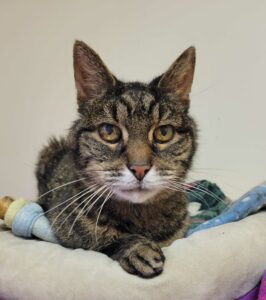
And that, perhaps, was what changed everything.
Mortimer could hold space for a lot of human silliness — the need to wear pants, the compulsion to play Pitbull, the endless Tolkien references, our earnest interest in anything “plant-based” when an entire “bologna-based” world exists — but not fear.
Mortimer could not countenance fear.
And so Mortimer — right on the heels of “hopeless,” fresh in the garden of mystery, here in the midst of a lowercase-d day — made us laugh.
Mortimer made us laugh as no one has ever made us laugh before, or shall again. Mortimer revealed a belly never before beheld. Mortimer choreographed geriatric grooves too charming for TikTok (and he may or may not have expressed concern about “all them kids with their tikkin’ and their tokkin”).
Mortimer cried “COWABUNGA!” as he crashed through walls we didn’t know were thirty feet high. They will never, ever, ever rise again.
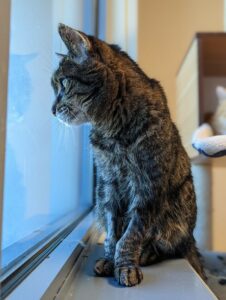 And if Mort has his way, neither will certain fears.
And if Mort has his way, neither will certain fears.
Mortimer, a nebula of need singing choruses of comedy, awakened songs inside us. You could scour the skies from here to Neptune and fail to find another Mortimer. But you only need one, and we had him, and he had us.
Good mercy, did he have us.
And so it was, on that lowercase-d day, that our hearts grew sweeter and stronger, stranger and sparklier. This was a gift from beyond ourselves, no less than the dawn. Left to our own devices and our own fear of the dark, we would have hurled up “CAUTION” signs at the first uncertainty, dug moats around our hearts as soon as we heard the news that Mortimer was mortal.
But we didn’t.
Because love changed us.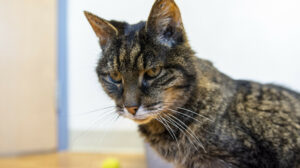
We hedge our bets against the risk of love. Mortimer carries his hedge-clippers everywhere he goes, the better to set us free.
And so, once again, there was a day in the annals of history when human beings became a bit more human, and time transcended itself. A line in the moon-dust was drawn, such that you could point to a “before Mort” and an “after Mort” and immediately recognize the difference.
Mortimer, flesh and fur, his future as clear as wax paper when we’d much prefer Saran wrap, could very possibly die on us.
On our more dismal days, we let fear kill the mystery before it dares to dawn. We hear the opening chords of joy, and we choke on the fear that the other shoe will drop.
But on Mort’s day, we let everything drop except the dance.
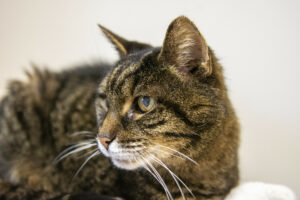 We loved the moment, because the moment was where Mortimer lived, and it turns out that we, too, were alive. A miracle.
We loved the moment, because the moment was where Mortimer lived, and it turns out that we, too, were alive. A miracle.
And so we became bigger.
The heart, once enlarged, cannot return to its safer size. We cannot go back across the “before Mortimer” line. We cannot hide behind the battle lines of armored caution.
Which means we can be who we are.
And tomorrow — be it a blessed lowercase-d day or the other kind — we can keep becoming.

Oh! What can I say, what can you do – this love is his forever, no matter how long or short, it is his forever.